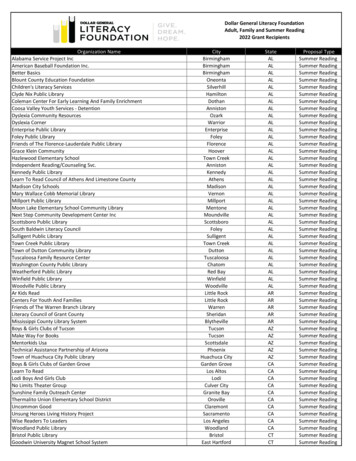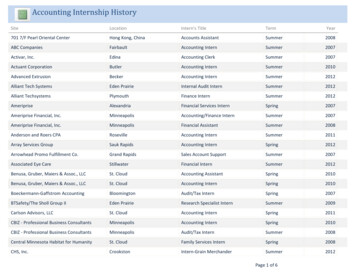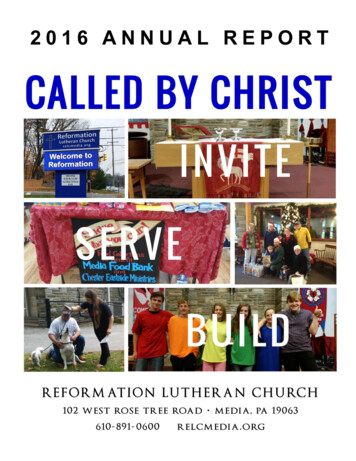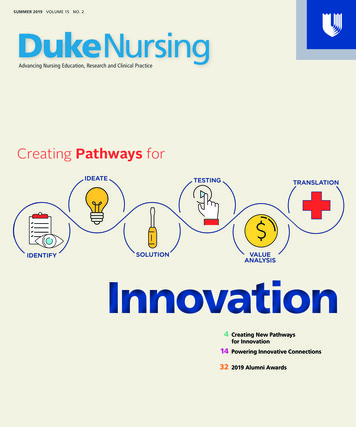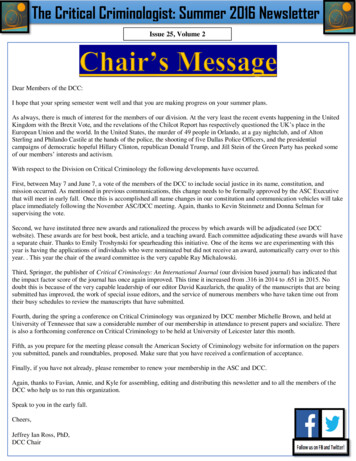
Transcription
The Critical Criminologist: Summer 2016 NewsletterIssue 25, Volume 2Dear Members of the DCC:I hope that your spring semester went well and that you are making progress on your summer plans.As always, there is much of interest for the members of our division. At the very least the recent events happening in the UnitedKingdom with the Brexit Vote, and the revelations of the Chilcot Report has respectively questioned the UK’s place in theEuropean Union and the world. In the United States, the murder of 49 people in Orlando, at a gay nightclub, and of AltonSterling and Philando Castile at the hands of the police, the shooting of five Dallas Police Officers, and the presidentialcampaigns of democratic hopeful Hillary Clinton, republican Donald Trump, and Jill Stein of the Green Party has peeked someof our members’ interests and activism.With respect to the Division on Critical Criminology the following developments have occurred.First, between May 7 and June 7, a vote of the members of the DCC to include social justice in its name, constitution, andmission occurred. As mentioned in previous communications, this change needs to be formally approved by the ASC Executivethat will meet in early fall. Once this is accomplished all name changes in our constitution and communication vehicles will takeplace immediately following the November ASC/DCC meeting. Again, thanks to Kevin Steinmetz and Donna Selman forsupervising the vote.Second, we have instituted three new awards and rationalized the process by which awards will be adjudicated (see DCCwebsite). These awards are for best book, best article, and a teaching award. Each committee adjudicating these awards will havea separate chair. Thanks to Emily Troshynski for spearheading this initiative. One of the items we are experimenting with thisyear is having the applications of individuals who were nominated but did not receive an award, automatically carry over to thisyear. . This year the chair of the award committee is the very capable Ray Michalowski.Third, Springer, the publisher of Critical Criminology: An International Journal (our division based journal) has indicated thatthe impact factor score of the journal has once again improved. This time it increased from .316 in 2014 to .651 in 2015. Nodoubt this is because of the very capable leadership of our editor David Kauzlarich, the quality of the manuscripts that are beingsubmitted has improved, the work of special issue editors, and the service of numerous members who have taken time out fromtheir busy schedules to review the manuscripts that have submitted.Fourth, during the spring a conference on Critical Criminology was organized by DCC member Michelle Brown, and held atUniversity of Tennessee that saw a considerable number of our membership in attendance to present papers and socialize. Thereis also a forthcoming conference on Critical Criminology to be held at University of Leicester later this month.Fifth, as you prepare for the meeting please consult the American Society of Criminology website for information on the papersyou submitted, panels and roundtables, proposed. Make sure that you have received a confirmation of acceptance.Finally, if you have not already, please remember to renew your membership in the ASC and DCC.Again, thanks to Favian, Annie, and Kyle for assembling, editing and distributing this newsletter and to all the members of theDCC who help us to run this organization.Speak to you in the early fall.Cheers,1Jeffrey Ian Ross, PhD,DCC Chair
DCC COMMUNICATION COMMITTEEHello Friends,DCC ExecutiveBoard MembersChair:Jeffrey Ian RossUniversity ofBaltimoreVice Chair:Emily TroshynskiUniversity ofNevada, Las VegasSec/Treasurer:Victoria CollinsEastern KentuckyUniversityExecutiveCounselors AtLarge:Kathryn HenneThe AustralianNational UniversityTravisLinnemannEastern KentuckyUniversityJayne MooneyCity University ofNew YorkWe hope you are enjoying the summer vacation!Many events have occurred since the last DCC newsletter. From the gaynightclub massacre in Orlando to the bombing at the Istanbul airport, these eventsare causing anxiety and uncertainty about the future. Additionally, Black LivesMatter protesters have descended unto the streets to protest the unrelated murdersof two black males by law enforcement. To further exacerbate problems, we areincreasingly witnessing xenophobia and nativism, which is evident in thesuccessful Brexit movement and the rise of Donald Trump as the presumptiveRepublican nominee for president. Given these realities, it is important that we(as critical criminologists) continue to deconstruct these disturbing and unsettlingevents through our teaching and academic writing. Perhaps, through thesechannels we can promote a discourse on addressing hate and violence? We aresure that there will be a space at the upcoming ASC conference for us to shareour thoughts and perspectives about these troubled times.On a lighter note, we are honoring the historical legacy of the DCC byestablishing an oral history project. We hope to establish a long standing columnin the newsletter by featuring historical anecdotes about the early days of theDCC. We will be creating a space on the DCC website to preserve thesenarratives for future generations of critical criminologists. Special thanks to RayMichalowski, Michael Lynch, Marty Schwartz, and Walter Dekeseredy for theircontributions for this issue.Lastly, the next DCC newsletter will be gearing up for the annual ASCconference in New Orleans! For more information about the conference, pleasesee the official ASC website, https://asc41.com/annualmeeting.htm. In theupcoming months, we will be releasing information pertaining to panels ofinterests and the DCC social so that you can plan accordingly. Be sure to makelodging accommodations as rooms are quickly being reserved.We present to you the Summer Edition of the Critical Criminologist. We hopeyou find this edition to be informative. As always, please email us atDivisiononCriticalCriminology@hotmail.com to submit materials for futureeditions of the newsletter.Be well and have a safe summer holiday,Past ChairDonna SelmanIndiana StateUniversityFavian, Annie, & Kyle2
CRIT CRIM NEWSCritical Criminology: An International JournalA message from David Kauzlarich (Editor-in-Chief):I bring good news! The 2015 Impact Factor scores are out and CriticalCriminology continues to climb the charts, despite its niche andoppositional mission which work against a high impact score. Our 2015score is .651 compared to .316 in 2014 and .191 in 2013. This represents a106% increase from 2014 to 2015 and a 240% increase since 2013.Thanks to all authors, Board members, area editors, reviewers, and specialissue editors for their fine work in helping make Critical Criminology amore powerful and visible force!DaveRichard Quinney TributeA message from Dragan Milovanovic & Clemens Bartollas:Clemens Bartollas and I are doing a much needed biography ofRichard Quinney. We would like to elicit brief written commentsabout (1) how his work impacted your early development as a criticalcriminologist (any "ah ha" moments? turning points? etc.), and/or (2)how, over the years to the present, his work has contributed to yourwork, and/or (3) how it has contributed to the development of criticalcriminology. We would like to select some quotes from yourcomments. Of course, you will be recognized in the book as thecontributor.Thanks much in advance.Please send your comments to Dragan Milovanovic, NEIU, Chicago,IL.Email: draganmilovanovic@neiu.edu3
More News!Critical Pedagogy CollectiveCarl Root, current member of the division’s Critical Pedagogy Collective, has agreed to serve onthe ASC Teaching Award Committee for 2017. The Teaching Award committee is responsiblefor nominations to the board for the society’s teaching award. Carla Barrett, current chair of thecollective, has agreed to serve on the ASC Teaching Committee for 2017. The ASC TeachingAward Committee oversees the Teaching Tips Column in The Criminologist and the collectionof web-based syllabi and other teaching tools, as well as working to organize sessions for theannual meetings.New Edition ForthcomingWalter DeKeseredy and Molly Dragiewicz are editing the second edition of the RutledgeHandbook of Critical Criminology. According to Walter, “there will be some new additions [tothe handbook], we are in the process of inviting people.” The second edition of the book is slatedto be released next year.The Atlantic's Rethinking Crime and Punishment: A Next AmericaForumThis event occurs during the DNC on July 26, 2016 in Philadelphia, PA.According to the press release, “across the country, cities and states arechanging policies and procedures to address the challenges facing ourcriminal justice system. From reforming mandatory minimum sentencesand reducing pretrial incarceration to creating diversion programs andaddressing racial disparities, there is growing bipartisan support to tacklethe overuse and misuse of jails. For Philadelphia, the urgency to bringreform is even greater. With nearly seven of every thousand city residentsbehind bars, Philadelphia has the highest incarceration rate of thecountry’s 10 largest cities. The city has recently embarked on an effort toreduce the prison population by 34% over the next three years. What are the solutionsPhiladelphia is exploring and what other strategies are being considered nationally? The Atlanticwill engage with city leaders, law enforcement officials, advocacy groups, academics, andformer inmates for a robust conversation about the crisis of mass incarceration.”For more information, please nking-crime-and-punishment/2016/4
UPCOMING EVENTSAmerican Society of CriminologyThe 2016 meeting – the 72nd Annual Meeting – will occur from November 1619, 2016 in New Orleans, Louisiana. The theme for the meeting is The ManyColors of Crime and Justice. For additional information, please visit:https://www.asc41.com/Annual Meeting/2016/2016annualmeetinginfo.htmlACJS 54st Annual MeetingThe 2017 meeting, which is titled “Linking Teaching, Practice, and Research”Will take place on March 21-25, 2017 at the Kansas City Marriott Downtown inKansas City, MO. The abstract submission system is now acjs17/#selected tagRequested Submission Deadline: September 15, 2016Final Submission Deadline: September 30, 2016Crime and Justice in Asia and the Global South: AnInternational ConferenceCrime and Justice in Asia and the Global South: An International ConferenceCo-hosted by the Crime and Justice Research Centre & the Asian CriminologicalSociety. The conference will take place on July 10-13, 2017 in Cairns, Australia.For more information, please click on the link:http://crimejusticeconference.com.au/To stay updated with the latest news, events & publications, subscribe to theCrime and Justice Research Centre blog: hcentre/5
NAME CHANGEVoting Results on Name Change for theDCC:On Tuesday June 7, 2016, voting forchanging the name of the Division from theDivision on Critical Criminology (DCC) tothe Division on Critical Criminology andSocial Justice, (including the constitution andall communication vehicles where the nameappears) closed.The results were as follows: 59 voted yes. 13 voted no.Division onCritical Criminology&Social JusticeThus the motion passes.Note: There were 15 ineligible votes that were eliminated from the final count.This information has been transmitted to the American Society of Criminology Executive. In theearly fall they will meet to consider this change.All changes will be enacted after the November 2016 American Society of CriminologyBusiness Meeting.The DCC Executive Committee wants to thank Kevin Steinmetz and Donna Selman forsupervising the vote.6
Award Season!The ASC Division on Critical Criminology (DCC) invites nominations for this year’s awards.This year, the DCC will sponsor six (6) awards: The Lifetime Achievement Award honors an individual’s sustained and distinguishedscholarship, teaching, and/or service in the field of critical criminology. The Critical Criminologist of the Year Award honors an early-to-mid-career individual’sdistinguished accomplishments that have symbolized the spirit of the DCC in some formof scholarship, teaching, and/or service in recent years. The DCC Praxis Award recognizes an individual whose professional accomplishmentshave increased the quality of justice for groups that have experienced class, ethnic,gender, racial and sexual disparities in policing and punishment. The DCC Praxis Awardhonors unique achievements in activism, commitment, persuasion, scholarship, serviceand teaching in areas that have made a significant impact on the quality of justice forunderserved, underrepresented, and otherwise marginalized populations. The DCC Practice Award recognizes the activist/practitioner who has participated inpublicly promoting and working towards the ideals of equality, justice and rights as theyrelate to the differential distribution of power in criminal justice and throughout societymore generally. The Graduate Student Paper Award recognizes and honors outstanding theoretical orempirical critical criminological scholarship by a graduate student. The Undergraduate Student Paper Award recognizes and honors outstanding theoreticalor empirical critical criminological scholarship by an undergraduate student.NEW AWARDS (starting 2016) The Teaching Award recognizes contributions that have made a significant impact onthe teaching of critical criminology at the local, state, regional, national, or internationallevel.7
o These contributions may include a) exemplary classroom teaching and/or studentengagement activities, b) leadership and innovation in teaching developmentssuch as the preparation of teaching and curriculum-related materials andpublications, c) contributions to the scholarship on teaching and learning, d)contributions to the enhancement of teaching within state, regional or nationalassociations.o Nomination process: Typically, someone – or a group of people – submit a letter,along with the CV of the nominee. Multiple letters of support are encouraged butnot required.o This award is adjudicated by the Critical Pedagogy Collective. Please send allrequired materials to Carla Barrett c/oteachingcritcrim@gmail.com. The DCC Book Award is intended to recognize and publicize a recent book publishedwithin the last 2 years that best serves to further the goals of the DCC by providing anoutstanding example of an effort to highlight relevant research, topics, frameworks,theories, etc. The book can be sole or co-authored, edited or co-edited. Textbooks aredisqualified. The Best Journal Article Award is intended to recognize and publicize a recent journalarticle published (either in-print or on-line) within the last 2 years that best serves tofurther the goals of the DCC by providing an outstanding example of an effort tohighlight relevant research, topics, frameworks, theories, etc.Nominations for the Lifetime Achievement Award, Critical Criminologist of the Year Award,DCC Praxis Award, and DCC Practice Award must be submitted electronically and includeletter(s) of nomination/support, as well as the nominee’s curriculum vitae. Nominations for thestudent paper awards must be submitted electronically and include the student’s unpublishedpaper. In order to further the careers of critical student scholars, the DCC Awards Committeemay, in consultation with the Editor-in-Chief, invite student paper awards winners to publishtheir papers in Critical Criminology: An International Journal.Nominations for the Lifetime Achievement Award, Critical Criminologist of the Year Award,DCC Praxis, DCC Practice, Graduate Student Award, and Undergraduate Student awards mustbe sent to Dr. Raymond J. Michalowski (Raymond.Michalowski@nau.edu) by September 15,2016.Nominations for the book, article, and teaching awards should be sent to respective chairs of thecommittees. Contact information will be available approximately August 1, 2016 and dueSeptember 15, 2016The DCC Awards Committee reserves the right to give no award in a particular year if it deemsthis appropriate.8
The Division on Critical Criminology Oral History ProjectWe present to you the inaugural column on the DCC Oral History Project. As previouslymentioned, we hope that this column educates future generations of critical criminologists on theorigins of the division. The line in Bob Marley’s song Buffalo Soldier, “if you know yourhistory, then you would know where you are coming from,” illustrates the importance ofunderstanding the history of the Division. The following narratives chronicle the creation of theDCC. Moving forward, we hope to get other perspectives about the DCC. If you wish to submita narrative for the next edition of the newsletter, please email us atDivisiononCriticalCriminology@hotmail.com. Lastly, special thanks to Walter, Ray, Marty, andMichael for their contributions to this column. Also, thanks to Travis Linnemann for the idea thatinitiated this project.Some Reflections on the Early Days of the Division onCritical CriminologyBy Walter DeKeseredyWest Virginia UniversityThe Division on Critical Criminology (DCC) has reached thepoint where there is plenty of room for various accounts of itsexciting history. As Ray Michalowski (1996) states in hishistory of the DCC, “This is all to the good. I increasinglysuspect that we can best arrive at useful truth by telling andhearing multiple versions of the same story” (p. 9). Newstories and new voices are always welcome in the DCC, andto repeat Elliott Currie (2008), “There is no party line here”(p. vii).9
Ray (1996, 2012) provides two excellent descriptions of the birth of the DCC and thus, it isbeyond the scope of this piece to revisit his accurate versions. Rather, I would like to add someinformation that has been seldom mentioned in discussions about the history of the DCC. Giventhat my chronicle is included in this newsletter, I think a good place to start is by offering ahistory of The Critical Criminologist because it was, and continues to be, one of the mostimportant components of the DCC.At a meeting organized by Susan Caringella and Bob Bohm to discuss the creation of the DCC atthe 1988 American Society of Criminology conference in Chicago, Bernard Headley and DraganMilovanovic suggested starting a newsletter to disseminate information and to connect criticalcriminologists around the world. Their proposal was unanimously endorsed and Dragan andBernard started the process. Brian MacLean then enthusiastically joined the team and these threepioneering scholars created The Critical Criminologist. Bernard and Dragan were primarilyresponsible for soliciting articles and Brian did all of what was then called the “desktoppublishing.” This is not to say, however, that he was not an equal intellectual force in thisproject. He certainly was, and he contributed some thought-provoking articles and helped recruitmanuscripts and announcements. In 1991, Dragan moved on and I joined the editorial team andmanaged to secure financial support from Carleton University in Ottawa, Canada where I wasbased from July 1989 to December 2000. My tenure as Co-Editor only lasted from September1991 to December 1993, but I must emphasize that these were among the best years of myacademic life and it was an honor to help produce what many people referred to as the “glue”that bonded DCC members together.At the risk of revealing my age, this newsletter emerged in an era when computerized means ofcommunicating with colleagues were in their infancy and so my editorial assistant Neil Slatteryand I used Carleton’s “snail mail” system to send it to subscribers. As well, Critical Criminologydid not then exist and thus The Critical Criminologist was a much needed source of progressiveinformation about a variety of issues and events of importance to our colleagues. It also helped tolaunch what were then four new directions in critical criminology: left realism, feminism,peacemaking, and postmodernism. Many of the essays on these variants of contemporary criticalcriminology ended up being published in the 1991 anthology New Directions in CriticalCriminology edited by Brian and Dragan and some DCC members used this book in theirgraduate and senior undergraduate classes.Little known, too, is the fact that Michael Lynch’s (1990) article in Critical Criminologist was,as Avi Brisman and Nigel South (2013) observe, “the springboard for much of the research onenvironmental harm and crime in the last 20 years” (p. 3). Other new fields of critical inquiryemerged with the assistance of their appearance in The Critical Criminologist and spacelimitations preclude me from mentioning all of them. The most important point to consider hereis that this newsletter was then, and still is, an integral part of critical criminology’s intellectualproject and should be viewed as producing progressive scholarship that meets the highest criticaldisciplinary standards.In the late 1980s and early 1990s, it was very difficult for early critical scholars to find venues topublish their work and The Critical Criminologist was a periodical that offered people at thecriminological margins an opportunity to express their voice. First, second, and third generation10
critical scholars are likely to recall that there were basically only three peer-reviewed journalssolely dedicated to publishing critical criminological scholarship: Crime, Law and SocialChange; the Journal of Human Justice (JHJ), and Social Justice. Thus, The CriticalCriminologist functioned as a journal and included book reviews at a time when it was difficultto get recognition for devoting considerable time and effort to producing monographs that wentwell beyond mainstream thinking about crime, law, and social control. What is more, criticalcriminologists around the world were encouraged and solicited to contribute short “think pieces”to the newsletter that were more works in progress than fully developed articles.Another seldom discussed part of the DCC’s history is that the journal Critical Criminology wasonce titled the JHJ and has strong roots in the Human Justice Collective (HJC) born in Canada in1989. The HJC consisted of nearly 35 Canadian progressive academics based at post-secondaryinstitutions across the country and from a variety of disciplines. Although the main focus of theHJC was Canadian, many members were also concerned with providing a more internationalfocus. Hence, a panel consisting of roughly 22 scholars was appointed from the United States,the United Kingdom, Australia, and New Zealand. Their role was to advise the HJC aboutinternational developments and to help JHJ editors maintain an international perspective while inCanada (Chesney-Lind, DeKeseredy, MacLean, & Milovanovic, 1996). However, some HJCmembers’ interest in making global connections and engaging with international scholarly andpolitical contributions was not well received by those who worried about the JHJ losing itsCanadian identity.Major conflicts between two prominent HJC members based at the same institution, and withone of them denied reappointment at this school, contributed to even more tension within theHJC. Ratner (2006) recalls that “News of the disaffection spread quickly, people took sides, and,for many, the Collective became an embattled site or a sour memory” (p. 653). Further, the JHJhad financial challenges. After three years of operation, the Social Sciences and HumanitiesResearch Council of Canada (SSHRCC) Aid to Scholarly Publications Program awarded the JHJa three-year grant, but shortly after classroom adoptions decreased and the subscription listshrank. The SSHRCC also decided that journals with less than 200 subscribers would no longerreceive funding. Consequently, the HJC was forced to disband and the JHJ was on life support(DeKeseredy, 2012).In 1995, the DCC adopted the JHJ and it became Critical Criminology. The first issue waspublished in 1996, and the Editor of the JHJ (Brian MacLean), Meda Chesney-Lind, DraganMilovanovic and I served as Co-Editors of this journal for a few years. As Ray Michalowski(1996) notes in the first issue, “Critical Criminology is not an entirely new journal – rather itemerges from the chrysalis of the former Journal of Human Justice thanks to the efforts of BrianMacLean and the editorial collective of that journal” (p. 9).This is one of what I hope to be many stories about the history of the DCC. Before ending myrendition, I would like to strongly emphasize that the DCC always played a key role inwelcoming and mentoring early scholars. In my own case, my career would not be what it istoday without experiencing the kindness and support of well-seasoned critical academics I metduring the early days of the DCC. The names that immediately come to mind are Gregg Barak,Bob Bohm, Susan Caringella, Elliott Currie, Meda Chesney-Lind, Karlene Faith, Bernard11
Headley, Drew Humphries, Dorie Klein, Brian MacLean, Ray Michalowski, DraganMilovanovic, Hal Pepinsky, Richard Quinney, Claire Renzetti, Martin Schwartz, Betsy Stanko,and Jock Young. I could easily name many more who made my critical criminological journeyeasier than it otherwise would have been and I think they know who they are.I would also like to mention that I have hard copies of The Critical Criminologist that wereproduced prior to, and during, my tenure as Co-Editor. It has always been my dream that one daythe articles featured in these volumes that did not appear in New Directions in CriticalCriminology would surface in another book. If not, I will work with my colleagues to help postthem online because they are products of what I see as one of the most stimulating eras in thehistory of the DCC. May today’s early critical scholars have as much fun as I did, and continueto have, working with DCC colleagues.ReferencesBrisman, A., & South, N. (2013). Introduction: Horizons, issues and relationships in greencriminology. In N. South & A. Brisman (Eds.), Routledge international handbook ofgreen criminology (pp. 1-23). London: Routledge.Chesney-Lind, M., DeKeseredy, W. S., MacLean, B. D., & Milovanovic, D. (1996). From theeditors. Critical Criminology, 7, 5-8.Currie, E. (2008). Preface. In K. Carrington & R. Hogg (Eds.), Critical criminology: Issues,debates, challenges (pp. vii-ix). Portland, OR: Willan.DeKeseredy, W. S. (2012). History of critical criminology in Canada. In W. S. DeKeseredy &M. Dragiewicz (Eds.), Routledge handbook of critical criminology (pp. 61-69). London:Routledge.Lynch, M. J. (1990). The greening of criminology: A perspective on the 1990s. The CriticalCriminologist, 2, 3-4, 11-12.MacLean, B. D., & Milovanovic, D. (Eds.). (1991). New directions in critical criminology.Vancouver, BC: The Collective Press.Michalowski, R. J. (1996). Critical criminology and the critique of domination: The story of anintellectual movement. Critical Criminology, 7, 9-16.Michalowski, R. J. (2012). The history of critical criminology in the United States. In W. S.DeKeseredy & M. Dragiewicz (Eds.), Routledge handbook of critical criminology (pp.32-45).Ratner, R. S. (2006). Pioneering critical criminology in Canada. Canadian Journal ofCriminology and Criminal Justice, 48, 647-662.12
Ray MichalowskiNorthern Arizona University(An Interview about the Origins of the DCC)Q: What was your first DCC meeting like (or yourearliest recollection of a DCC meeting)?A: At the risk of sounding flip, my first meeting with the DCCoccurred before there was a DCC. Specifically, it took place at the1988 ASC meeting in Chicago, when a collection of Marxist,radical, feminist, left-oriented, progressive, and activistcriminologists met to discuss creating an ASC Division that wouldrecognize and support the emergence of alternatives to the dominantcriminological paradigm that accepted state definitions of crime,with all of the gender, class, and racial consequences hidden inthose definitions.Some of us still active in today’s DCC attended this birth. As thishistory recedes further into the past, this is probably a good time topreserve the backstory of the DCC’s origins.In 1987, Bill Chambliss was elected ASC president, and he asked me to serve as Program Chair.For several years, some of us had been discussing whether we should seek a division for a moreradical version of criminology. When Bill was elected, we figured that the stars were about asaligned in favor of a new division as they would ever be, so I created a meeting slot explicitly forthis discussion. Bob Bohm organized the session, and about 40 progressive criminologists, someof whom are still active in the division today, met to discuss the advisability of requesting ASCapproval.Those who know the DCC only through its formal history as part of the American Society ofCriminology, may not know that its roots reach back 14 years early, and are inseparable fromefforts to suppress the development of radical criminology, the progenitor of today’s criticalcriminology.In the late 1960s and early 1970s, a group of Marxist criminologists created a center for radicalcriminology linked to the UC-Berkeley School of Criminology. Key among these were JuliaSchwendinger, Herman Schwendinger, Tony Platt, Paul Takagi and Barry Krisberg (Shank,1999). Along with their graduate students and a few other Berkeley colleagues, they establishedthe first concentration of radical criminologists in the United States. Among other things they13
formed the Union of Radical Criminology and transformed the graduate student journal, Issues inCriminology, into Crime and Social Justice (now Social Justice). This new journal was anexpressly Marxist forum dedicated to "the search for socialist solutions to the problemcharacterized as 'crime'
With respect to the Division on Critical Criminology the following developments have occurred. First, between May 7 and June 7, a vote of the members of the DCC to include social justice in its name, constitution, and . Summer 2016 Newsletter. 2 DCC COMMUNICATION COMMITTEE Hello Friends, We hope you are enjoying the summer vacation!





